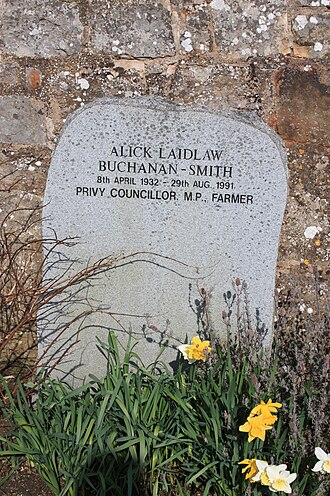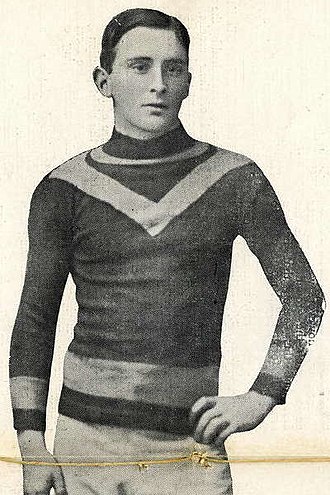Discover Your Roots
SIGN UPDiscover Your Roots
SIGN UPAlick is a gender-neutral name of English origin, meaning "Defender of the People." It is both a given name and a surname. The name's origin reflects its English roots and its gender-neutral nature makes it suitable for both boys and girls. Notable individuals with the given name Alick include Alick Aluwihare, a Sri Lankan politician, Alick Buchanan-Smith, a British soldier and politician, and Alick Macheso, a Zimbabwean musician. The surname Alick is associated with Elijah Alick, an Australian rugby league player. Alick's meaning as "Defender of the People" conveys strength and protection, making it a powerful and meaningful name choice for any gender.

Alick Laidlaw Buchanan-Smith (8 April 1932 – 29 August 1991) was a prominent Scottish Conservative and Unionist politician. He held various significant positions throughout his political career, including serving as Parliamentary Under-Secretary of State for Scotland, Minister of State for Agriculture, Fisheries and Food, and Minister of State for Energy. Buchanan-Smith was known for his involvement in the Conservative Party's stance on Scottish devolution, notably leading the Conservative contribution to the Yes campaign in the 1979 Scottish devolution referendum. Despite his significant contributions to the party, he faced challenges within the Conservative leadership, notably resigning from his post over the party's policy shift on Scottish devolution. Additionally, he was reported to have voted for Sir Anthony Meyer in the 1989 Conservative leadership election. Buchanan-Smith's political journey was characterized by his dedication to the Conservative Party, despite facing internal conflicts and health challenges. His legacy endures, and he is laid to rest in Currie Cemetery alongside his family. His impact on Scottish politics and the Conservative Party continues to be remembered and studied.

Alick Isaacs FRS (17 July 1921 – 26 January 1967) was a Scottish virologist known for his groundbreaking work in the field of interferon research. Born in Glasgow to Jewish immigrant grandparents who fled Lithuania to escape oppression, Isaacs' early life was marked by the influences of his family's history. He obtained his Doctor of Medicine degree from the University of Glasgow in 1954 and went on to co-discover interferon with Swiss virologist Jean Lindenmann in 1957. He served as the head of the Laboratory for Research on Interferon at the National Institute for Medical Research until his untimely death at the age of 45. Isaacs received numerous accolades for his work, including the Bellahouston Gold Medal and election as a Fellow of the Royal Society in 1966. His legacy lives on through his pioneering contributions to virology, and a collection of his laboratory notes is preserved at the National Library of Medicine in Bethesda, Maryland. Isaacs' work continues to inspire and inform future generations of researchers in the field of virology.

Brigadier Alick Drummond Buchanan-Smith, Baron Balerno (9 October 1898 – 28 July 1984) was a prominent British soldier and geneticist. Born in Glasgow, he was the son of Alice Lillian and the Very Rev. George Adam Smith. Buchanan-Smith excelled academically, graduating from the University of Aberdeen with a degree in sciences. His career in genetics began at the Institute of Animal Genetics in Edinburgh, where he made significant contributions and was later awarded a Doctor of Science. During World War II, he served with the Gordon Highlanders and later held various military education positions. In recognition of his service, he was appointed as an Officer of the Order of the British Empire (OBE) and later received a knighthood. Buchanan-Smith's dedication to military education and genetics research earned him numerous accolades and positions of influence. In 1963, he was granted a life peerage as Baron Balerno. His family included notable figures such as politician Alick Buchanan-Smith and philanthropist Mary Drummond Corsar. Buchanan-Smith's contributions to genetics are immortalized in his publication "The Genetics of the Pig." He is buried alongside his family in the north-east corner of Currie Cemetery.

Alick Donald Walker (26 October 1925 – 4 December 1999) was a prominent British palaeontologist known for his significant contributions to the field of paleontology. Born in Skirpenbeck, near York, he attended Pocklington School before pursuing a degree in Geology at the University of Bristol. Walker's pioneering work included the reclassification and naming of English theropod dinosaurs, such as Eustreptospondylus and Metriacanthosaurus. Notably, he devised a new casting method using PVC to capture anatomical information in fossils, leading to the preservation of many casts in renowned museums. His research on the origin of crocodilians and birds stirred controversy, particularly with his 1972 paper in Nature proposing a close relationship between sphenosuchian crocodylomorphs and birds. Although he later reconsidered this hypothesis, his work significantly influenced the understanding of prehistoric reptiles and their evolutionary connections. Walker's lasting impact is evident in his selected publications and his enduring legacy in the field of paleontology.

Thomas Alexander Ogilvie (7 January 1887 – 18 August 1915) was an Australian rules footballer known for his career at the University Football Club and Melbourne Football Club in the Victorian Football League (VFL). Born in Williamstown, Australia, Ogilvie was the youngest child of Captain John Ogilvie and Elizabeth Ogilvie. He attended Scotch College, Melbourne, and later pursued law at the University of Melbourne. Ogilvie made 27 appearances as a forward for University in the VFL, representing Victoria in the 1908 Melbourne Carnival. After completing his law degree, he began his legal practice in Rutherglen and Corowa before enlisting with the 12th Infantry Battalion in September 1914. Despite facing a court martial, he was promoted to second lieutenant and participated in the ANZAC landing at Gallipoli. Tragically, Ogilvie sustained a severe gunshot wound during the attack on Lone Pine and succumbed to his injuries on 18 August 1915 at the age of 28. He was buried at Pieta Military Cemetery in Valletta, Malta. Ogilvie's legacy is honored as one of the Victorian Football League players who died on active service during World War I.
All images displayed on this page are sourced from Wikipedia or Wikimedia Commons.We use these images under their respective Creative Commons or public domain licenses. Wherever applicable, author attributions and license information are provided. If you believe an image is used incorrectly or outside its license terms, please contact us so that we can review and correct the issue.